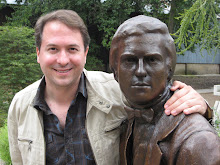Day One
Monday afternoon, July 6th
David Kohn from the Darwin Correspondence Project explored Darwin’s mental development of his species concept from the period of his Voyage up to the writing of The Origin. Jim Mallet argued with data from hybridization that the textbook view of biological species is much messier in nature, and that Darwin had a better concept of a species than that of primary members of the modern synthesis during the 1950s and 60s (personally, I'm not so sure about this conclusion, but I haven't read any of Mallet's findings). Loren Rieseberg, from the University of British Columbia, the same school where I teach (in fact I recently moved into his old office), continued the theme of hybridization and its role in creating new species in plants, with many examples from his own research in sunflowers. Sandra Knapp from the Natural History Museum of London is a plant taxonomist who shared a real–world view of species from her work with genus that includes tomatoes and potatoes and discussed the importance of world-wide biodiversity inventories. David Baulcombe from Cambridge described his work on RNA virus induced epimutations in plants, or non-genetic heritable evolution. Overall we learned the concept of species was well understood my Darwin, but is still very complex and shifting as we learn more about the natural world.
After the conference events of the day Angie and I grabbed a quick but very tasty dinner at a Persian restaurant called Shiraz and then met up with an old friend of mine who happens to live and work in Cambridge for an evening of swing dancing. Our brains felt full and so we needed to have a few pints and exercise our bodies for a change. It was a great evening and we slept VERY soundly after a few hours of dancing the Charleston!
Day Two will bring a morning session of Society and Health and an afternoon of The Changing Views of Evolution.
Tuesday, July 7, 2009
Subscribe to:
Post Comments (Atom)



No comments:
Post a Comment